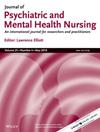Caregiver burden during psychiatric hospitalisation: A multi-centre, longitudinal study
Abstract
What is known about the subject
- Caring for a family member with a mental illness induces a burden on the caregiver, an impact on their quality of life and premature ageing of more than ten years.
What the paper adds to existing knowledge
- We conducted systematised and individualised nursing interviews with family members, on the first days of a relative’s hospitalisation, during hospitalisation and three months after discharge.
- We observed persistent depressive symptoms during and after hospitalisation. Burden and depression were higher, and quality of life was lower, for women caregivers and when the caregivers admitted the patients involuntarily in the hospital ward. When the caregivers were experiencing a patient’s first hospitalisation, we also found higher depressive symptoms and lower quality of life.
What are the implications for practice
- This study emphasises the need for new interventions such as psychoeducation to alleviate the suffering of families. Considering the burden of families could become a prevention objective from the patient’s first hospitalisation and prevent them from mental or physical health problems.
4.1 Introduction
The burden consequent to providing care to patients with psychiatric chronic conditions is often overlooked by health professionals.
4.2 Aim
We assessed the impact of patients' psychiatric hospitalisation on their caregivers, through evaluating their suffering, burden and quality of life, in three stages: upon the patients' admission, their discharge and 3 months after their discharge.
4.3 Method
In total, 127 caregivers of adult patients whose first hospitalisation was less than 5 years ago were assessed using the 36-item Short-Form Health Survey, the Zarit Burden Interview and the Center for Epidemiologic Studies Depression scale.
4.4 Results
Females and caregivers who admitted patients against their will experienced higher burden and depression and lower mental quality of life. We also found higher depressive symptoms and lower quality of life among caregivers during a patient's first hospitalisation. The caregiver's familial relationship to the patient was not associated with these outcomes. Finally, burden decreased and quality of life increased over time.
4.5 Discussion
Results suggest that several variables associated with patient hospitalisations were correlated with burden, depression or quality of life.
4.6 Implications for Practice
Burden could be targeted with interventions such as group psychoeducation for caregivers during or after the patient's hospitalisation, in order to reduce their distress and improve their quality of life. Psychiatric and mental health nurses can provide support to caregivers with systematic assessments of their burden and quality of life, so as to better meet their needs and promote their ability to cope with mental illness.

 求助内容:
求助内容: 应助结果提醒方式:
应助结果提醒方式:


